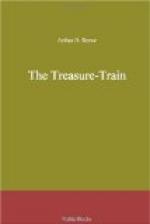Hastily we drove back to the laboratory and Kennedy set to work again developing the second set of skiagraphs. I had not long to wait, this time, for him to study them. His first glance brought me over to him as he exclaimed loudly.
At the point just opposite the sore which he had observed on Virginia’s forehead, and overlying the sella turcica, there was a peculiar spot on the radiograph.
“Something in that mask has affected the photographic plate,” he explained, his face now animated.
Before I could ask him what it was he had opened a cabinet where he kept many new things which he studied in his leisure moments. From it I saw him take several glass ampules which he glanced at hastily and shoved into his pocket as we heard a footstep out in the hall. It was Chapelle, very much worried. Could it be that he knew his society clientele was at stake, I wondered. Or was it more than that?
“She’s dead!” he cried. “The old lady died last night!”
Without a word Kennedy hustled us out of the laboratory, stuffing the X-ray pictures into his pocket, also, as we went.
As we hurried down-town Chapelle told us how he had tried to keep a watch by bribing one of the neighbors, who had just informed him of the tragedy.
“It was her heart,” said one of the neighbors, as we entered the poor apartment. “The doctor said so.”
“Anemia,” insisted Chapelle, looking carefully at the body.
Kennedy bent over, also, and examined the poor, worn frame. As he did so he caught sight of a heavy linen envelope tucked under her pillow. He pulled it out gently and opened it. Inside were several time-worn documents and letters. He glanced over them hastily, unfolding first a letter.
“Walter,” he whispered, furtively, looking at the neighbors in the room and making sure that none of them had seen the envelope already. “Read these. That’s her story.”
One glance was sufficient. The first was a letter from old Stuart Blakeley. Reba Rinehart had been secretly married to him—and never divorced. One paper after another unfolded her story.
I thought quickly. Then she had had a right in the Blakeley millions. More than that, the Blakeleys themselves had none, at least only what came to them by Blakeley’s will.
I read on, to see what, if any, contest she had intended to make. And as I read I could picture old Stuart Blakeley to myself— strong, direct, unscrupulous, a man who knew what he wanted and got it, dominant, close-mouthed, mysterious. He had understood and estimated the future of New York. On that he had founded his fortune.
According to the old lady’s story, the marriage was a complete secret. She had demanded marriage when he had demanded her. He had pointed out the difficulties. The original property had come to him and would remain in his hands only on condition that he married one of his own faith. She was not of the faith and declined to become so. There had been other family reasons, also. They had been married, with the idea of keeping it secret until he could arrange his affairs so that he could safely acknowledge her.




